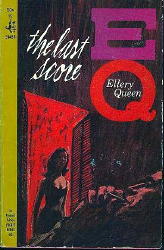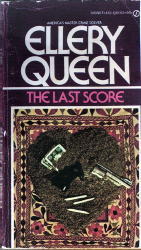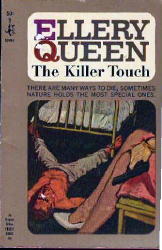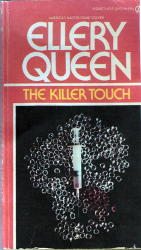|
CHARLES RUNYON 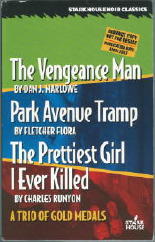 INTERVIEW - Conducted by Ed Gorman Stark House will publish its first three-fer this summer – three Gold Medal novels long in need of reprinting. I wrote the introduction to Charles Runyon’s The Prettiest Girl I Ever Killed, a masterful suspense novel that puts Runyon in the top ten of GM writers in such company as Lawrence Block, John D. MacDonald, Charles Williams, Vin Packer, Richard Stark, Malcolm Braly and a handful of others. At the time I wrote the introduction I was told that Runyon was dead. Not so. He’s very much alive, and here’s an interview I recently had with him via email. [Note: This interview previously appeared in three installments on Ed’s blog.] The obvious mystery to those who were following your career – when did you stop publishing and why? In 1980, Jove published my novel, The Gypsy King, which I thought represented my highest effort, a cut above the genre SF and mystery novels I had been publishing. I was never content with working at the level of my last published work, but at the same time I wasn’t sure which way to go with my future work. To fill in the time while deciding, I went back to the University of Missouri and picked up a Master’s in Creative writing, in case I might need to work before my sales picked up again. However, the hiatus stretched on, and teaching did not blend with writing as well as I had hoped. Writing was still my preferred profession, but the path back to publishing was a rocky one, and nobody laid down a red carpet for me any more than they had at the beginning. Somehow the word got out that I had “passed on” in 1987, and the thought intrigued me, much as it once intrigued Tom Sawyer. What if I tried to reenter the field, not as an older writer reentering the field after a long lay-off, but as a fresh new face with reams of new ideas? However, thanks to you, Ed, that experiment has now been abandoned, or left to others to carry out. Can you give us a sketch of your life? A rough sketch would show the young writer growing up on a farm in Worth County, Missouri, the most insignificant county in a not-too-significant state. I couldn’t wait to grow up and leave the farm like most boys, but ran away from home at age 16 to work on a ranch in West Texas. So we come full circle; 60 years later I am back in Texas. The intervening years included army service in Korea, Germany and Indiana, J-school at Missouri University. I just missed a job on the National Geographic and instead went into industrial editing. It was either that or poetry which paid nothing. While working for Mr. Rockefeller’s old outfit in Chicago an agent to whom I had been paying readers’ fees for five years – Scott Meredith – suddenly started making sales. I lost no time in quitting my job and announcing that I was now a full-time writer. With a new baby and no income, I borrowed a lakeside cabin and sat down to write my first book. After sending it off to my agent, I took off for the West Indies, found an almost deserted island, and lay back to await the gentle shower of royalties. It didn’t quite happen that way, but it was only a few months before the book sold to Ace; my reaction was to charter a yacht and take the wife and kid on a tour of the islands. I returned to New York suntanned but broke, still expecting the gilded life of a best-selling writer. How about a sketch of your publishing career? Was writing something you’d always wanted to do? Since I was about 8 years old, and realized how easily (comparatively) words came to me. Before that I wanted to be a doctor, until somebody told me you had to go to school for endless years. I was already making preparations when in High School I took typing; the only other “boy” in my class was a pianist. Do you recall your first sale? Of course; it was a short story called “First Man in a Satellite” to Super Science Fiction in 1958 – almost fifty years ago! This was about the time the Russians sent up Sputnik so I was undeservedly credited with being a harbinger of the Space Age. I got a personal rejection from John W. Campbell [editor at Astounding SF], with his signature slanting across the bottom of the page as if tracing the path of a tumbling tumbleweed. He disparaged the whole idea of a midget in a space ship, adding that Lester del Rey had already done it – better. Editors didn’t care about writer’s sensibilities in those days. I still treasure the letter. Which gave you more satisfaction as a writer – science fiction or crime novels? It’s the sf novels and stories that I remember with the most affection. T he crime stories and novels were more neatly wrapped up, while the sf novels and stories open onto worlds of other plot possibilities. What was the genesis of The Prettiest Girl I Ever Killed? I was making notes for the book while spending the summer in my old home town of Sheridan, a place with an almost one-to-one correspondence to the Sherman of the book. The characters were pulled from the scenery of my past, specific incidents belonging to a real person could be welded to a fictional person without the need to improvise more than details of the plot. It was very liberating and exhilarating, to find that I could shape my own reality, as long as I kept it within the realm of the believable. Actually, the story is not as bizarre as it may seem; my home town is near the little town of Skidmore, famed as the home of the hog-stealer, arch-bully, pedophile and murderer MacElroy, who was finally “executed” by a shotgun blast in full view of thirty townspeople. Not a single one of those citizens stepped forward to identify the shooter. Someday, I may get around to doing that book. Prettiest Girl is invariably likened to the novels of Jim Thompson but when I reread it recently my take was that there is a fundamental difference between your book and just about anything Thompson wrote. Your killer in control of himself – unlike many of the Thompson protagonists who seem hard-wired to be at the mercy of themselves – and he’s even a bit droll and sardonic at times. In other words, he can stand back and look at what he’s doing objectively. The cumulative effect of this subtly but powerfully underscores his madness. Given the verities of paperback originals, this was an original approach. Did you think of it that way? Or are you even conscious of your writing decisions? Evan Hunter always said that he tried not to analyze what he was doing. He was afraid it would hamper his spontaneity. I will have to read some of Jim Thompson before I comment on the difference between us. I always write in a close autobiographical style, even though I often change the pronouns to third person. When I finish a book, I always feel like a hollowed out lobster, all meat and flavor taken out, and nothing but dry pulp left inside. That’s the reason I usually get in a few weeks of total leisure between novels; the creative energy needs time to rise to a level where I can begin pumping again. I think Evan Hunter is right in not analyzing his methods; the creative imagination is a shy, faery creature, and doesn’t like the cold light of appraisal. Sometimes you sound almost dismissive of your crime fiction. Your science fiction seems to be your true love. Are you unhappy when people say they prefer your crime fiction to your sf? No, I just assume that these are non-sf-readers by nature. As long as I could treat these crimes as merely head games, I could get considerable pleasure out of working out the problems. Having been a police reporter, I had a good grasp of the routine and the jargon, as well as tons of material. But I can date exactly when my preferences changed; in 1967 my younger brother was murdered, and the whole messy scene got involved with the stupidity of Vietnam and the decay of the courts, with the result that the murderer walked out of the courtroom smirking. This was too similar to the stuff I had been doing, and although I had many projects in the works, I never felt good about doing that sort of killer-oriented thing again. You’ve written some of the most remarkable opening chapters in suspense fiction. The first five thousand words of The Dead Cycle, for instance, put me in mind of The Doors’ “Riders on The Rain.” Except that where the song is from the innocents’ point of view, this is from the Riders pov. There’s a mythic quality – almost of the old west – of the robbery gone wrong, an elderly clerk shot dead by one of the Riders, and them now desperately trying to get to the Mexican border. This is so much more realistic than much of the neo-noir we see today because the turf is real and you know this turf, the small-town Midwest. But it’s the underbelly of the Midwestern small town you usually use. Was this intentional given that it’s the setting of so many of your Gold Medal novels? Sometimes I wonder if I’m really a fiction writer. The motorcycle story was based on an unusual honeymoon my wife and I took, riding double on a Harley through the back roads of Mexico in 1957. Add another couple, a murder, a stash of cash and some loose gash and you get The Death Cycle. It was fun to write, and to know that every bone-rattling jolt on that old Harley was paying off in hard core realism. The Black Moth, which is set on a college campus, is a notably different private eye novel in that the protagonist is a PI masquerading as a professor. But even here, in a more refined setting than you usually use, the writing stays hard as hell. Your books are proof that tough guys don’t have to swagger or be violent to prove that they’re tough. They’re hard asses and no less so when they don academic robes. Was Black Moth based on your early experiences teaching college courses? At the time I wrote The Black Moth I had never taught a college English course, but it definitely foreshadowed my later career. The idea was to have a series of vicious murders taking place amid the mannered politeness of an exclusive girl’s finishing school. And in Columbia Missouri, where I did my journalism study, there was Stephens College, the very model of such a school. My undergraduate years of dating Stephens girls paid off in some interesting characters and loads of verisimilitude. One of the fallacies of the lay person is that you can “create” characters out of whole cloth. With me, it’s more of a cut-and-paste. What was your best career experience? Winning a nomination for the Edgar Allan Poe award of the MWA for Power Kill. What was your worst? Having Lancer Books go belly-up just after publishing my novel of the occult, Dorian-7. I wish I’d been warned about their shaky finances. I wrote an article on the subject, “The Curse of Dorian-7,” but I never tried to get it published. [The article appears below, its first time in print.] You mentioned that you’ve been writing a science fiction trilogy. Have you given any thought to a crime novel? Many thoughts, backed up by notes, bits of dialogue, and in a few cases, almost-finished works that never quite made it to the marketplace. I’ll take another look at the material and see what I have that is timely and appropriate, if you’re interested in looking at it. Do you read contemporary writers? If so, name a few you feel are notable. I read Stephen King’s Cell, on the recommendation of my students, and found it admirable in many ways, but to me the most nearly perfect practitioner of the horror field is Peter Straub. Houses without Doors is my most recent sampling, but my all-time favorite is Ghost Story. I also enjoyed Superstition. John Updike’s suspense novel, The Terrorist, brings out his talent for deft characterization and subtle plot turnings, as well as being as timely as the morning paper. John Grisham is another old-timer who’s still eminently readable; The Painted House is one I recommend. Taking the whole field as my bailiwick, I’ll mention Trial, by Clifford Irving, Skins of Dead Men by Dean Inge, and Acceptable Losses by Irwin Shaw. I’d also recommend The Greenlanders by Jane Smiley. Though it’s not a genre novel, it’s a fascinating story and well-written. Which of your novels would you most like to see reprinted and why? There are at least three that might go down well with today’s readers. The Last Score was rushed to completion as a work-for-hire, for Manfred Lee and Fred Dannay, and published under their byline of Ellery Queen. I still have a paternal affection for the book, and would like to see it reprinted under it’s “rightful” parentage. Also, there was one I wrote under the nom de plume of Mark West, which was published under the unforgettable title: Object of Lust. Another rush job, done to the background music of a wolf growling outside the door, but I think it’s worthy of another shot at the gold ring. If you recall the old limerick beginning: “There once was a hermit named Dave ...” you’ll have an idea of what it’s about. And finally there’s my first one, The Anatomy of Violence, which still holds my interest despite a klutzy romantic element. As Charles Runyon 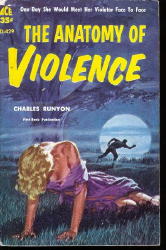 # The Death Cycle (n.) Gold Medal s1268, pbo, January 1963. “Behind them a murdered man. Ahead of them a lot of loving, lying, speeding and spending. Reprinted as “The Naked Bums,” Man’s World, April 1964; probably condensed. 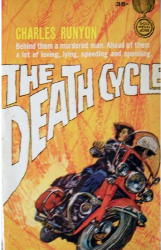 # Color Him Dead (n.) Gold Medal k1320, pbo, July 1963 [Caribbean] “He escaped to a tropical island and met the native girl who could make a man forget anything – anything but the years he lost in prison for a murder he didn’t commit.” 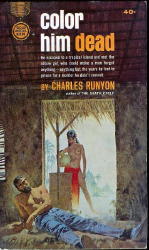 = Reprinted as The
Incarnate, Manor Books 15235, pb, 1977. “There was nothing
she
would not do to make him forget.”
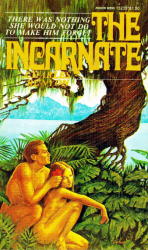 # The Prettiest Girl I Ever Killed (n.) Gold Medal k1507, pbo, 1965. “A strange novel of suspense.” 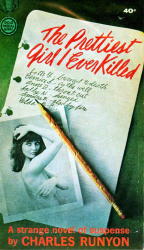 # -Bloody Jungle (n.) Ace G-594, pbo, 1966 [Viet Nam], as by Charles W. Runyon. “A powerful novel of the Green Berets in Vietnam.” 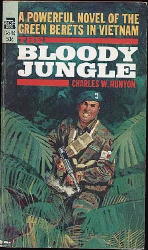 # The Black Moth (n.) Fawcett Gold Medal d1873; 1967 [Illinois] “They were spoiled, over-ripe little girls too wise for their years and some of them had to die, those who wore ... The Black Moth.” 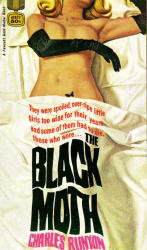 # No Place to Hide (n.) Gold Medal R2218, pbo, 1970. “Violent death made them lovers and outcasts with – No Place to Hide.” [Robert McGinnis cover] 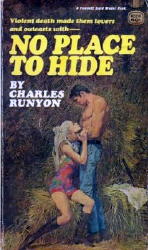 # Power Kill (n.) Gold Medal T2560, pbo, May 1972. “First-rate suspense ... compellingly readable.” -- Mario Puzo. 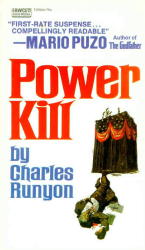 # Something Wicked (n.) Lancer 1973. UPDATE from Charles: Something Wicked was apparently the title put on Dorian-7 by the inheritors (if that is the right word) of the Lancer properties. [This makes this the book that Lancer paid for but never published before they went out of business. For more on the “curse” on this book, Charles has much more to say here.] # To Kill a Dead Man (n.) Major 3061, pbo, 1976 [Caribbean] “He was an assassin for hire – no assignment was too large!” UPDATE from Charles: A Killer is a Lonely Man was my title for this novel. [The latter title appears in some bibliographies as an unpublished book that Charles wrote.] 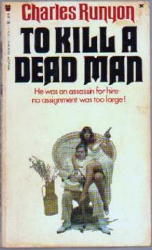 # Kiss the Girls and Make Them Die (n.) Pyramid 03963, pbo, 1977, as by Charles W. Runyon. [Hospital] “In the sterile white corridors of a mental ward – and the unexplored passages of the mind – unfolds a novel of heart-clutching terror, with a cast of characters caught inextricably in its lurking mystery.” 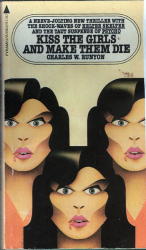 As Ellery Queen
# The Last Score (n.) Pocket Books 50486, pbo, November 1964. Signet Q6102; pb, Oct 1974 [Mexico] (Rich couple’s daughter is kidnapped under the nose of her travel agent chaperone Reid Rance while on vacation in Mexico, and he’s got to get her back.)
# The Killer Touch (n.) Pocket Books 50494, pbo, October 1965. Signet Q6514, pb, 1975. [Caribbean] “There are many ways to die, sometimes nature holds the most special ones.”
# Kiss and Kill (n.) Dell 4567, pbo, April 1969. [Mexico] “The lady was luscious, and death followed everywhere she went.”  As Charles Runyon, Jr.
Gypsy King (n.) Jove 04041, pbo, 1979. Historical Romance. “His million dollar empire stretched to the White House and beyond, but he didn’t even know his name.” 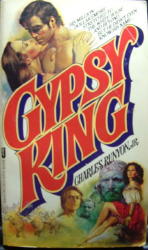 As Charles W. Runyon
Pig World (n.) Doubleday, hc, 1971. SF. 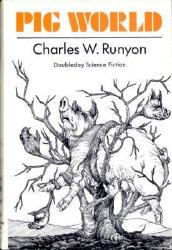 = Lancer 75446, pb,
n.d. “Charles W. Runyon’s harrowing new novel of the near future
– when millions of captive minds will have but one master!”
 Ames Holbrook, Deity (n.) Curtis 07202, pbo, 1972. SF. 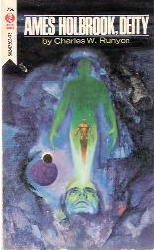 Soulmate (n.) Avon 18028, pbo, March 1974. Horror. Expanded from the story “Soulmate,” Magazine of Fantasy & Science Fiction, April 1970. “A contemporary horror tale & a strong one, not recommended for the squeamish.” 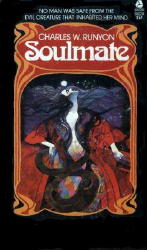 I, Weapon (n.) Doubleday, hc, July 1974. SF. 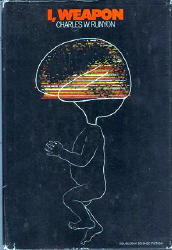 = Popular Library 04127, pb,
December 1977. “He was the ultimate man – and humankind's last
hope for
survival.”
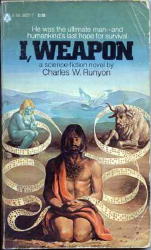 As Mark West
Office Affair (n.) Beacon B-421Y, pbo, 1961. “She learned her tricks at the bottom of the heap – and he was her ticket to the top!” 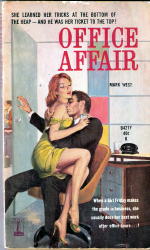 His Boss’ Wife (n.) Beacon B-466F, pbo, 1962. “He was a man on the make and this time he wanted – his boss’ wife.” 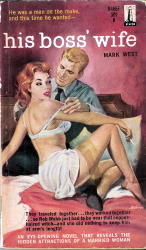 Object of Lust (n.) Beacon B-468F, pbo, 1962. “She was beautiful, lonely and an ... object of lust.” [The cover is that of the 3rd printing.] 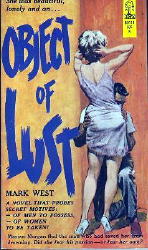 ●● Asked about the criminous content of the Mark West books, here’s what Charles had to say: “Crime in the Beacon books? In Object of Lust, Lewis stalked the woman and then kidnapped her and held her prisoner in a cave. (The setting is Branson, Mo, famous for caves and country music.) “His Boss’ Wife involves a traveling maggie crew run by a dominant male who intimidates his females into doing his will, and controls the young males by parceling out the favors of his harem. Crimes abound, since these maggies are always on the line between fraud, larceny, breaking and entering, flirting daily with accusations of rape and assault. “I still have these kids coming to my door and delivering the same sales pitch I used to hand out back in ’50 when I did my tour as a maggie. Sex predominates, because the editor had a feeling that readers wouldn’t stick past page 38 unless they read at least one explicitly graphic sex act. For me the important element was the tribal conflict between The Old Man and the brash upstart who joined the crew one morning in Minneapolis. “In Office Affair, the crime was Insider Trading, which landed Milliken and several others in the slammer. Involves the aggressive young CEO of Wolverine Pipeline Co and his lovely Chief Stockholder, who fight off a hostile takeover while enjoying a sex-romp around the executive suite.” Mystery and Suspense Magazines
“Hangover Manhunt” Manhunt, December 1960 “The Last Kill” Manhunt, April 1961. UPDATE from Charles: “Rum and Chaser” was the title put on this story by Scott Meredith (or somebody working there at the time; perhaps Terry Carr) but that didn't go down with the editor of Manhunt, who replaced it with my original title, “The Last Kill.” “The Possessive Female” Manhunt, June 1961 [see below] “Sales Pitch” (by Mark Starr) Manhunt, June 1961 [see below] “The Death Gimmick” Mike Shayne Mystery, March 1962 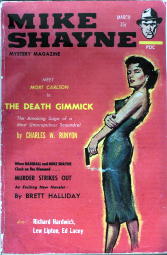 “The Waiting Room” Alfred Hitchcock Mystery, October 1969 “The Dead Survive” Mike Shane Mystery, September 1974 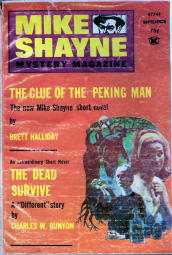 “A Good Head for Murder” Alfred Hitchcock Mystery, November 1974 “The Company of Brave, Rich Men” Alfred Hitchcock Mystery, April 1975 “An Act of Simple Kindness” Mike Shane Mystery, November 1975 “Death Is My Passenger” Mike Shayne Mystery, June 1976 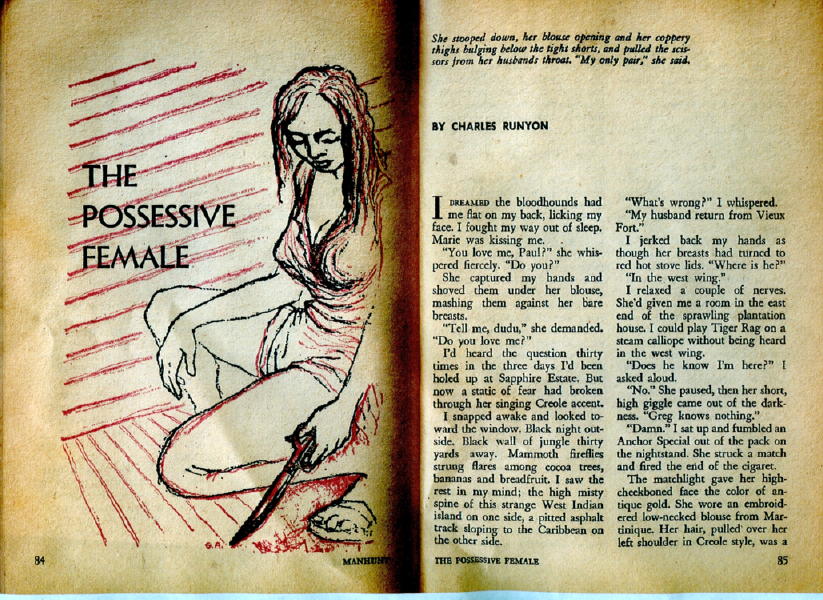  Science Fiction and Fantasy
“First Man in a Satellite” Super Science Fiction, December 1958 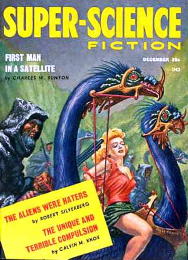 “Solution Tomorrow” Fantastic, September 1959 “Remember Me, Peter Shepley” Fantastic, December 1960 “Happiness Squad” Fantastic, March 1967 “The Youth Addicts” Worlds of IF, May 1967 “Sweet Helen” Magazine of Fantasy & Science Fiction [F&SF], September 1969 “Dream Patrol” F&SF, February 1970 “Soulmate” F&SF, April 1970. Expanded into the novel Soulmate (Avon, pbo, 1974) “Once There Were Cows” F&SF, July 1974 “Noomyenoh” F&SF, January 1975 “Terminal” F&SF, August 1975 “In Case of Danger, Prsp the Ntxivbw” F&SF, December 1975 “Brain Diver” F&SF, March 1976 “The Sitter” F&SF, July 1976 “Daughter of the Vine” F&SF, April 1977 “Metafusion” Stellar 3: Science Fiction Stories, Judy-Lynn Del Rey, ed. (Ballantine/Del Rey, pbo, October 1977) “The Liberation of Josephine” F&SF, September 1978
Men’s Magazines
“The Naked Bums” Man’s World, April 1964, book-length novel reprint of The Death Cycle (Gold Medal, pbo, 1963), probably condensed. “Never Kiss a Killer” Adam 1965 Yearbook. 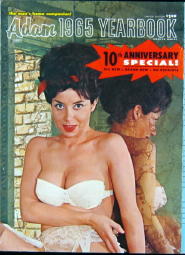 “The Appointment” Knight Magazine, March 1970 “Cycle Death Run” Men, April 1970. –
The basis for this bibliography was Crime Fiction IV, by Allen J. Hubin, and the records of
Charles Runyon. Thanks
also to Bill Crider and Charles Runyon for providing many of the cover
images seen on this page.
By
Charles W. Runyon
I have come to believe that there is a mysterious force
that causes a book to get published, as if some unseen hand guided the
author
and smoothed the path to publication. And
there is another force which opposes, oppresses,
confounds and
befuddles an author, so that even after he surmounts all the physical
obstacles
and holds victory in his grasp …
Snatches it away.
As if “They--”
The hidden, occult and unseen powers that bedevil us,
Did not want the book to see the light of day.
I will tell you the story of such a book.
It begins in Cadiz, Spain. I
was awaiting a check and had carefully budgeted myself
so that I could
live in a cheap pension for a month, eat every day, and still
have
enough money to take me home to Missouri, where I could survive on
credit until
I made another sale.
By way of autobiography I might add that I was the type of
literary figure that could only be described as a tramp writer. However else I may phrase it, I always
sought to enjoy life as a first priority, and to write books when I
needed
money to live.
Which tended to be fairly often.
I had been doing this for twenty years and I hadn’t
starved
yet, so I felt like I was a successful writer.
To recap, I was living in this pension (rooming
house) in Cadiz, Spain -- money running out, as usual.
Wife had gone back to Missouri to put the
kids in school. I got a clipping from
my agent about a lad who’d had his friends kill him so that he could --
as he
believed -- return from the dead.
The publisher thought I might be interested in developing
this idea, and was offering a good advance. I
tried to work in Cadiz, but it was August and the entire
French nation
had gone on vacation, and at least half of them had come to Cadiz. I caught a boat to the Canary Islands,
looking for peace and quiet.
The island of Fuerteventura, just off the coast of the
Spanish Sahara, seemed to offer what I was looking for.
It’s almost a complete desert island.
They grow millet, which they grind into
flour and mix with goats’ milk to make a paste called gofio. The only person I knew there was an ex-Royal
Air Force wing commander, Hugo Traherne. He
was a Englishman who wrote occasional articles for the
Canary Islands Sun, an English language newspaper put out by an
American
woman named
Terry Hill. Hugo had a drinking
problem. In fact, he was a shameless
alcoholic.
I found him painting a door in a mechanic’s shop. I said I was looking for a place to write,
and he said that Augustin -- the mecanico -- had a rancho four
miles
outside of town that would be ideal. So
I helped Hugo finish painting the door, and Augustin drove us out in
his 1928
Chevrolet.
The rancho was four rooms around a central patio, all
built
of adobe. Outside, purple sand
stretched as far as you could see in every direction.
There was an asphalt road a quarter-mile away; traffic was
about
two cars a day. I drew my water from a
well across the road. Wild canaries
sang in the patio. (Did you know that
canaries are green in their native land?) I
had one bougainvillea vine growing in a little patch of
ground covered
by cinders. The cinders drew moisture
from the air and kept the plant alive -- because it never rained on
Fuerteventura.
I spent a day or two arranging my new environment, then I
started to work. Hugo came out twice a
week, swept the sand out of my kitchen, and drank up all my cognac. After a time I quit stocking cognac, and
Hugo’s visits tapered off.
I was working nights, which I’ve always found ideal for
writing about the supernatural. You
can’t get the proper chlll during daylight.
That meant I slept during the day. I
was keeping vampire hours.
One morning I woke up and smelled smoke outside my
window. I looked out and saw an
extended family of Canarios camped outside with a big iron pot
hanging
over an open fire. They ‘d built the
fire out of one of the doors off the house.
I smiled and asked, What are you doing?
The man smiled and said, We’re making gofio.
I wasn’t sure they had a right to be there, but I wasn’t
paying rent either, so I didn’t run them off.
After a couple of days they went away, and I got back to
work. One morning I woke up and saw a
policeman standing at the foot of my bed beaming down at me. I assumed he was there to arrest me for
burning up the doors. But he said the
local judge wanted to see me. I made an
appointment to meet him in a cantina in town the following afternoon.
At the appointed hour I got on my borrowed bicycle and
coasted into town -- a four mile trip, all downhill.
Coming back was always rugged. The
judge wanted to talk to me about Hugo. It
seems Hugo had dreamed up a plan for condensing
sea-water with
reflectors beaming sunlight onto black-pained pipe.
He was trying to sell it to the island for ten thousand
pesetas. Since I was an American, and
therefore an assumed expert on the latest scientific gadgetry, the
judge wanted
my opinion on whether or not it would work. I
studied the blueprint and told the judge it looked
feasible. I expected to be off the island
in a week or
two, anyway. I figured if Hugo
collected ten grand, he could pay back the five hundred pesos he’d
borrowed
from me.
Well, I wasn’t off the island in a week, because the word
leaked out that I was a normal human being, not a vampire after all. So I began to get visitors.
One afternoon I opened the door and there stood Hugo
swaying from side to side with a cognac bottle in his fist. “I’ve brought your cousins!” he
bellowed. I have several blond cousins,
so I looked the pair over carefully. I
didn’t recognize either one.
Hugo had a flamboyant manner of speaking, when drunk. I finally learned that these two were from
Canada, and in Hugo’s book that made them cousins.
I think he cast himself as the father of us all, because
he gave
them one of the rooms in Augustin’s house.
It was the only other room with a door.
In a couple of days, things quieted down.
Claudia did the cooking, Dick did the shopping,
and we split the food bill fifty-fifty. Her
only bad habit was frying potatoes with the peelings
on. She also liked to sunbathe in the
patio with her peelings off -- nude, that is -- but I didn’t
see that
as a problem.
After a week Hugo decided to move into the one remaining
vacant room. He didn’t need a
door. Usually he couldn’t see it
anyway.
Hugo knew every lush on the island, and in the next couple
of weeks they all stopped by. They’d
spend the night drinking in the patio, so I wasn’t getting any work
done.
I moved out, caught a boat to Las Palmas, a plane to
Madrid, a superjet to New York, and thence to St. Louis.
I arrived home at midnight on the same day
I’d left the island.
The book was only half-done. I
moved back into my old
studio and got to work. By this time
I
had the story laid out. It was about a
suicide club whose members make a pact to go out one by one. After the first death, they change their
minds … only to discover that the pact is still being carried out,
apparently
by a hand from beyond the grave.
I was beginning to suspect that something was trying to
keep the book from being written. Ridiculous,
of course.
One night around midnight I was working, and I heard a roaring noise, like a distant
jet. It was cold outside, and I had the
oil heater turned up. I thought I was
burning kerosene -- but I didn’t know that due to the fuel shortage,
someone
had delivered a cheap grade of fuel oil, and it had built up a highly
flammable
soot deposit in the chimney.
I could hear it roaring, and I thought:
right away I’ll get up and throw that
five gallon container of water on the
stovepipe and cool it off. But you see,
I’d crossed that invisible line of illusion, and the fire wasn’t real
to
me. Only the book was real.
I thought, Just as soon as I finish this
paragraph…
It was getting hot in the room and I could smell pine
smoke
and realized the roof had caught fire. I
ran outside and grabbed the five-gallon jug of water and
started up
the ladder. Fire was shooting out of
the chimney like a blowtorch. I got
close enough to tip up the jug, and discovered that it had frozen solid.
I ran to the house, about fifty yards away, turned on the
outside faucet, grabbed one end of the plastic garden hose, and started
running
toward the studio. The hose snapped
into several neat semi-circular pieces. I
threw open the door and yelled into the house: “The
shed’s on fire!” Mark,
who was fourteen, stood there blinking
and rubbing his eyes, then went back to bed. Ruth
grabbed a dishpan and shoved it under the kitchen
faucet. I stood there watching the water
dribble
out, and wished I’d taken the trouble to clean the calcium buildup off
that
little screen at the end of the faucet. But
you never get time for things like that when you’re
writing a
book.
I grabbed the dishpan and started running toward the
pond. I glanced over my shoulder and
saw fire crawling up the side of my studio. I
overshot the edge of the pond and found myself sliding
across the
ice. It thinned out at the center and
dropped me chest-deep into icy water. I
struggled ashore with about half a dishpan full of water, ran toward
the shed,
and fell over the skull of a pig that the dog had dragged up into the
yard.
Pig’s skulls are very significant in sorcery, but I didn’t
think about that at the time.
I decided that fate had decreed the end of the shed -- but
that didn’t mean I had to lose my precious books and manuscripts. I notified Ruth that we were going to
evacuate the studio, got Mark out of bed again, and sent him off to the
neighbors to call the fire department -- our telephone was disconnected
-- and
we started after the manuscripts. These
were stored in the loft, and the loft was ablaze. So
I just dropped the trunks and file boxes
through the trapdoor.
Of course several broke open, so we began pushing crumpled
masses of paper out through the door. As
the fire burned hotter, and the paint cans started
exploding, we
had to push them further and further back, and the snow was melting
into mud.
One of my most poignant memories of this night was
watching
the fire engine go past on the highway, light flashing and siren
shrieking. They’d missed our turnoff,
but I figured they’d be back eventually.
They did get back in time to save six feet of the wooden
fence that stood about ten yards from the shed. I
managed to save all my manuscripts -- crumpled and muddied --
my IBM Selectric typewriter, my armchair, and a metal filing case that
I’d
thought contained one copy each of all my books. What
it actually contained was several envelopes full of
cancelled checks that I’d been saving for the internal revenue people.
I also saved the typescript of the book I’d been working
on, and I was more determined than ever to finish it.
To make it short, I finished the book, sent it off to the
publisher, and got my acceptance check.
Now the act of writing a book is not complete until you
can
hold the finished product in your hand, bound and dust-covered, with
your name
appearing in large print under the title. I
knew the publisher was having trouble -- one of the
editors had gone
south with a large amount of cash -- but I was assured that they were
keeping
their heads above water and would publish the book in September.
I scheduled a TV appearance on our local station and wrote
my agent asking him to send me the first copies to that I could display
them on
the show. He wrote back and said that
he wouldn’t be able to send copies because
the editor had just that very day -- ha ha --
declared
bankruptcy.
So that’s where it stood. My
agent said he was sending the book around to other
publishers, and
was confident that it would still find its way into print.
But I wonder: Will
that be the end of the curse? Or will
it just go on and on, like the curse of the Hope Diamond?
Only time will tell.
YOUR COMMENTS ARE WELCOME.
Copyright © 2007 by Steve Lewis. All rights reserved to
contributors.
|
